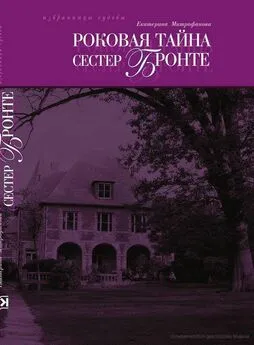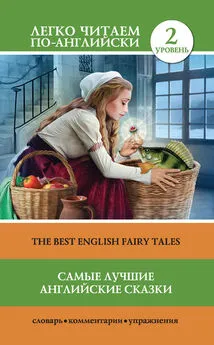Шарлотта Бронте - Лучшие романы сестер Бронте / The best of the Brontë sisters
- Название:Лучшие романы сестер Бронте / The best of the Brontë sisters
- Автор:
- Жанр:
- Издательство:Литагент «Эксмо»334eb225-f845-102a-9d2a-1f07c3bd69d8
- Год:2013
- Город:Москва
- ISBN:978-5-699-61892-7
- Рейтинг:
- Избранное:Добавить в избранное
-
Отзывы:
-
Ваша оценка:
Шарлотта Бронте - Лучшие романы сестер Бронте / The best of the Brontë sisters краткое содержание
«Иностранный язык: учимся у классиков» – это только оригинальные тексты лучших произведений мировой литературы. Эти книги станут эффективным и увлекательным пособием для изучающих иностранный язык на хорошем «продолжающем» и «продвинутом» уровне. Они помогут эффективно расширить словарный запас, подскажут, где и как правильно употреблять устойчивые выражения и грамматические конструкции, просто подарят радость от чтения. В конце книги дана краткая информация о культуроведческих, страноведческих, исторических и географических реалиях описываемого периода, которая поможет лучше ориентироваться в тексте произведения.
Серия «Иностранный язык: учимся у классиков» адресована широкому кругу читателей, хорошо владеющих английским языком и стремящихся к его совершенствованию.
Лучшие романы сестер Бронте / The best of the Brontë sisters - читать онлайн бесплатно ознакомительный отрывок
Интервал:
Закладка:
‘Then you really wish to get rid of me?’
‘Positively, I do; and I will take you down myself to Grassdale, and then return. I shall not be absent above a week or fortnight at most.’
‘But if I must go, I will go alone: if you must stay, it is needless to waste your time in the journey there and back.’
But he did not like the idea of sending me alone.
‘Why, what helpless creature do you take me for,’ I replied, ‘that you cannot trust me to go a hundred miles in our own carriage, with our own footman and a maid to attend me? If you come with me I shall assuredly keep you. But tell me, Arthur, what is this tiresome business; and why did you never mention it before?’
‘It is only a little business with my lawyer,’ said he; and he told me something about a piece of property he wanted to sell, in order to pay off a part of the incumbrances on his estate; but either the account was a little confused, or I was rather dull of comprehension, for I could not clearly understand how that should keep him in town a fortnight after me. Still less can I now comprehend how it should keep him a month, for it is nearly that time since I left him, and no signs of his return as yet. In every letter he promises to be with me in a few days, and every time deceives me, or deceives himself. His excuses are vague and insufficient. I cannot doubt that he has got among his former companions again. Oh, why did I leave him! I wish – I do intensely wish he would return!
June 29th. – No Arthur yet; and for many days I have been looking and longing in vain for a letter. His letters, when they come, are kind, if fair words and endearing epithets can give them a claim to the title – but very short, and full of trivial excuses and promises that I cannot trust; and yet how anxiously I look forward to them! how eagerly I open and devour one of those little, hastily-scribbled returns for the three or four long letters, hitherto unanswered, he has had from me!
Oh, it is cruel to leave me so long alone! He knows I have no one but Rachel to speak to, for we have no neighbours here, except the Hargraves, whose residence I can dimly descry from these upper windows embosomed among those low, woody hills beyond the Dale. I was glad when I learnt that Milicent was so near us; and her company would be a soothing solace to me now; but she is still in town with her mother; there is no one at the Grove but little Esther and her French governess, for Walter is always away. I saw that paragon of manly perfections in London: he seemed scarcely to merit the eulogiums of his mother and sister, though he certainly appeared more conversable and agreeable than Lord Lowborough, more candid and high-minded than Mr. Grimsby, and more polished and gentlemanly than Mr. Hattersley, Arthur’s only other friend whom he judged fit to introduce to me. – Oh, Arthur, why won’t you come? why won’t you write to me at least? You talked about my health: how can you expect me to gather bloom and vigour here, pining in solitude and restless anxiety from day to day? – It would serve you right to come back and find my good looks entirely wasted away. I would beg my uncle and aunt, or my brother, to come and see me, but I do not like to complain of my loneliness to them, and indeed loneliness is the least of my sufferings. But what is he, doing – what is it that keeps him away? It is this ever-recurring question, and the horrible suggestions it raises, that distract me.
July 3rd. – My last bitter letter has wrung from him an answer at last, and a rather longer one than usual; but still I don’t know what to make of it. He playfully abuses me for the gall and vinegar of my latest effusion, tells me I can have no conception of the multitudinous engagements that keep him away, but avers that, in spite of them all, he will assuredly be with me before the close of next week; though it is impossible for a man so circumstanced as he is to fix the precise day of his return: meantime he exhorts me to the exercise of patience, ‘that first of woman’s virtues,’ and desires me to remember the saying, ‘Absence makes the heart grow fonder,’ and comfort myself with the assurance that the longer he stays away the better he shall love me when he returns; and till he does return, he begs I will continue to write to him constantly, for, though he is sometimes too idle and often too busy to answer my letters as they come, he likes to receive them daily; and if I fulfil my threat of punishing his seeming neglect by ceasing to write, he shall be so angry that he will do his utmost to forget me. He adds this piece of intelligence respecting poor Milicent Hargrave:
‘Your little friend Milicent is likely, before long, to follow your example, and take upon her the yoke of matrimony in conjunction with a friend of mine. Hattersley, you know, has not yet fulfilled his direful threat of throwing his precious person away on the first old maid that chose to evince a tenderness for him; but he still preserves a resolute determination to see himself a married man before the year is out. “Only,” said he to me, “I must have somebody that will let me have my own way in everything – not like your wife, Huntingdon: she is a charming creature, but she looks as if she had a will of her own, and could play the vixen upon occasion” (I thought “you’re right there, man,” but I didn’t say so). “I must have some good, quiet soul that will let me just do what I like and go where I like, keep at home or stay away, without a word of reproach or complaint; for I can’t do with being bothered.” “Well,” said I, “I know somebody that will suit you to a tee, if you don’t care for money, and that’s Hargrave’s sister, Milicent.” He desired to be introduced to her forthwith, for he said he had plenty of the needful himself, or should have when his old governor chose to quit the stage. So you see, Helen, I have managed pretty well, both for your friend and mine.’
Poor Milicent! But I cannot imagine she will ever be led to accept such a suitor – one so repugnant to all her ideas of a man to be honoured and loved.
5th. – Alas! I was mistaken. I have got a long letter from her this morning, telling me she is already engaged, and expects to be married before the close of the month.
‘I hardly know what to say about it,’ she writes, ‘or what to think. To tell you the truth, Helen, I don’t like the thoughts of it at all. If I am to be Mr. Hattersley’s wife, I must try to love him; and I do try with all my might; but I have made very little progress yet; and the worst symptom of the case is, that the further he is from me the better I like him: he frightens me with his abrupt manners and strange hectoring ways, and I dread the thoughts of marrying him. “Then why have you accepted him?” you will ask; and I didn’t know I had accepted him; but mamma tells me I have, and he seems to think so too. I certainly didn’t mean to do so; but I did not like to give him a flat refusal, for fear mamma should be grieved and angry (for I knew she wished me to marry him), and I wanted to talk to her first about it: so I gave him what I thought was an evasive, half negative answer; but she says it was as good as an acceptance, and he would think me very capricious if I were to attempt to draw back – and indeed I was so confused and frightened at the moment, I can hardly tell what I said. And next time I saw him, he accosted me in all confidence as his affianced bride, and immediately began to settle matters with mamma. I had not courage to contradict them then, and how can I do it now? I cannot; they would think me mad. Besides, mamma is so delighted with the idea of the match; she thinks she has managed so well for me; and I cannot bear to disappoint her. I do object sometimes, and tell her what I feel, but you don’t know how she talks. Mr. Hattersley, you know, is the son of a rich banker, and as Esther and I have no fortunes, and Walter very little, our dear mamma is very anxious to see us all well married, that is, united to rich partners. It is not my idea of being well married, but she means it all for the best. She says when I am safe off her hands it will be such a relief to her mind; and she assures me it will be a good thing for the family as well as for me. Even Walter is pleased at the prospect, and when I confessed my reluctance to him, he said it was all childish nonsense. Do you think it nonsense, Helen? I should not care if I could see any prospect of being able to love and admire him, but I can’t. There is nothing about him to hang one’s esteem and affection upon; he is so diametrically opposite to what I imagined my husband should be. Do write to me, and say all you can to encourage me. Don’t attempt to dissuade me, for my fate is fixed: preparations for the important event are already going on around me; and don’t say a word against Mr. Hattersley, for I want to think well of him; and though I have spoken against him myself, it is for the last time: hereafter, I shall never permit myself to utter a word in his dispraise, however he may seem to deserve it; and whoever ventures to speak slightingly of the man I have promised to love, to honour, and obey, must expect my serious displeasure. After all, I think he is quite as good as Mr. Huntingdon, if not better; and yet you love him, and seem to be happy and contented; and perhaps I may manage as well. You must tell me, if you can, that Mr. Hattersley is better than he seems – that he is upright, honourable, and open-hearted – in fact, a perfect diamond in the rough. He may be all this, but I don’t know him. I know only the exterior, and what, I trust, is the worst part of him.’
She concludes with ‘Good-by, dear Helen. I am waiting anxiously for your advice – but mind you let it be all on the right side.’
Alas! poor Milicent, what encouragement can I give you? or what advice – except that it is better to make a bold stand now, though at the expense of disappointing and angering both mother and brother and lover, than to devote your whole life, hereafter, to misery and vain regret?
Saturday, 13th. – The week is over, and he is not come. All the sweet summer is passing away without one breath of pleasure to me or benefit to him. And I had all along been looking forward to this season with the fond, delusive hope that we should enjoy it so sweetly together; and that, with God’s help and my exertions, it would be the means of elevating his mind, and refining his taste to a due appreciation of the salutary and pure delights of nature, and peace, and holy love. But now – at evening, when I see the round red sun sink quietly down behind those woody hills, leaving them sleeping in a warm, red, golden haze, I only think another lovely day is lost to him and me; and at morning, when roused by the flutter and chirp of the sparrows, and the gleeful twitter of the swallows – all intent upon feeding their young, and full of life and joy in their own little frames – I open the window to inhale the balmy, soul-reviving air, and look out upon the lovely landscape, laughing in dew and sunshine – I too often shame that glorious scene with tears of thankless misery, because he cannot feel its freshening influence; and when I wander in the ancient woods, and meet the little wild flowers smiling in my path, or sit in the shadow of our noble ash-trees by the water-side, with their branches gently swaying in the light summer breeze that murmurs through their feathery foliage – my ears full of that low music mingled with the dreamy hum of insects, my eyes abstractedly gazing on the glassy surface of the little lake before me, with the trees that crowd about its bank, some gracefully bending to kiss its waters, some rearing their stately heads high above, but stretching their wide arms over its margin, all faithfully mirrored far, far down in its glassy depth – though sometimes the images are partially broken by the sport of aquatic insects, and sometimes, for a moment, the whole is shivered into trembling fragments by a transient breeze that sweeps the surface too roughly – still I have no pleasure; for the greater the happiness that nature sets before me, the more I lament that he is not here to taste it: the greater the bliss we might enjoy together, the more I feel our present wretchedness apart (yes, ours; he must be wretched, though he may not know it); and the more my senses are pleased, the more my heart is oppressed; for he keeps it with him confined amid the dust and smoke of London – perhaps shut up within the walls of his own abominable club.
Читать дальшеИнтервал:
Закладка:










